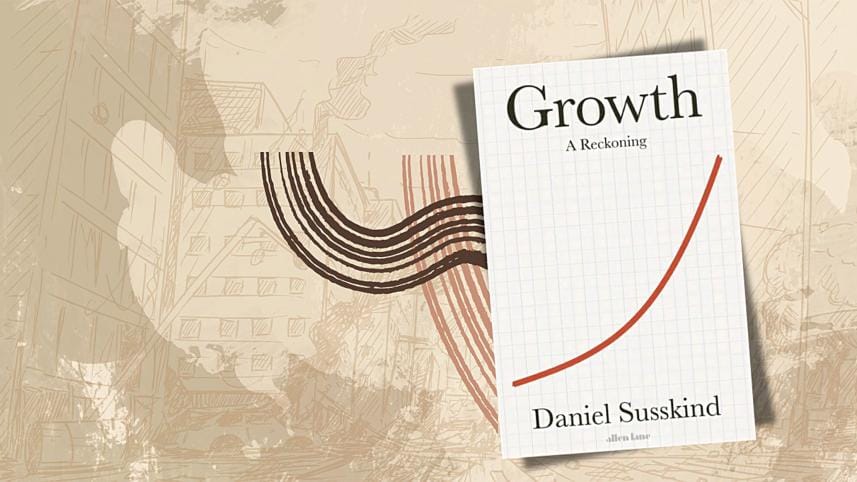Is this the end of growth as we have known it?

The world only began to experience notable economic growth in the late 19th century. Even then, it was the reserve of heavily industrialised nations. Thanks to the mercantilist policies of Europe's empires, this meant that territories like the Bengal weren't merely prevented from industrialising, but deindustrialised.
Meanwhile, sooty corners of northern Europe and America steamed ahead, eventually spewing their expansionist economic systems onto the rest of the world. Yet measurements of gross domestic product wouldn't appear until almost a century later. The boom-and-bust years of the 1870s-90s came and went with nobody any wiser as to their causes. Whether our economies were growing or shrinking, we simply had no clue. Having a means to calculate GDP had therefore become desirable.
Even as late as the Great Depression in 1929, world governments still lacked any means to measure GDP. American President Franklin Roosevelt's New Deal was largely a statistical groping in the dark. In fact, the American economy wouldn't fully recover until 1942, when investment and production soared to meet wartime demands.
It was during the Second World War that precise methods to measure GDP were established. At this time, John Maynard Keynes in his book How to Pay for the War: A Radical Plan for the Chancellor of the Exchequer (Macmillan and Co., 1940) began to define the way we would do so for years to come.
The Cold War, too, was as much a race of production as it was a scramble to out-spy and out-contain hostile ideologies. Nikita Khrushchev declared in 1956 that it was the USSR's imperative to eclipse the world's capitalist nations in per capita output. The Marshall Plan, which lifted America's allies from their post-war squalor, stipulated that recipients must calculate and report their GDPs. This placed growth centre stage.
The immense growth that followed postwar reconstruction in Europe coupled with the Keynesian statism shaped in their wartime economies. This led to the creation of expansive welfare, healthcare, and education systems.
But now that it is faced with the longest period of stagnation since the beginning of the postwar period, the rich world is scrambling for answers that may keep its expensive social models alive.
King's College London's Daniel Susskind duly enters the debate with Growth: A Reckoning. In it, he reminds us that growth has been associated in every country with higher living standards and longevity. In 1950, two thirds of the world lived in extreme poverty. Now only one tenth does.
Yet economic growth is also bringing upon us an ecological disaster of Biblical proportions. The imposition on certain developing countries of free market policies has encouraged cash cropping and, at times, stagnation. Highly globalised economies have also seen disruption to their traditional communities. As economist Joseph Stiglitz said, "in the quest to increase GDP we may end up in a society where citizens are worse off."
One toted solution is that of 'degrowth': deliberately shrinking the economy. But Susskind states that this would involve plunging the vast majority of the world's population into poverty. Current provisions of healthcare and education, already deemed globally inadequate, would necessarily shrink. For Susskind, this amounts to throwing the baby out with the bathwater.
After all, those who support degrowth believe that there will be an eventual recession anyway, due to the excesses of current growth. It's dissonant to then claim that we need to instate it now, Susskind argues. The difference, a 'degrowther' might respond, is that their scenario tries to steer us away from systemic ecological collapse. The alternative doesn't.
It's the enormity of the climate crisis that Growth frustratingly fails to address. In its very short history, vast economic growth has already set us on a path of utter self destruction. The nations who have benefitted least from growth are also the most vulnerable. This truth overshadows any celebration of the reduction in world poverty that we have achieved over the past few decades.
For Susskind, though, there's no reason to believe that future economic growth needs to be associated with greater emissions. Many countries have managed to grow their economies while reducing emissions, including the United States and many European states. But that is not to say that their economies have become remotely sustainable.
By extension, why should we believe that the 'decoupling' of emissions and growth can surpass the point at which we are able to avoid climate catastrophe? Susskind admits to there being a trade-off. Tackling the USD 1 trillion the world spends on subsidising fossil fuels could be a start.
Growth is a comprehensive guide that initiates the reader into the silently existential issue of our age. Making sense of the dilemmas levied in the book will be key to our survival.
Susskind writes in an approachable way. He guides uninitiated readers through important contemporary ethical problems related to growth, its history, and potential future. This should be considered required reading for all those struggling to understand where the climate crisis, social problems, and world's economy intersect.
Theodore Griffin, a student of philosophy, languages, and politics, splits his time between France and Scotland.



 For all latest news, follow The Daily Star's Google News channel.
For all latest news, follow The Daily Star's Google News channel.
Comments